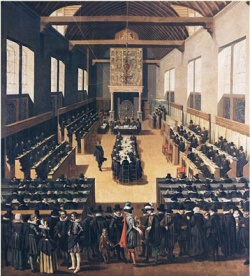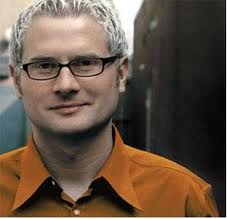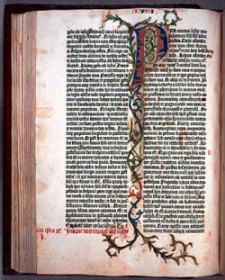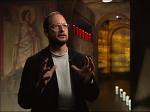 Article 14: The Way God Gives Faith
Article 14: The Way God Gives Faith
In this way, therefore, faith is a gift of God, not in the sense that it is offered by God for man to choose, but that it is in actual fact bestowed on man, breathed and infused into him. Nor is it a gift in the sense that God bestows only the potential to believe, but then awaits assent--the act of believing—from man's choice; rather, it is a gift in the sense that he who works both willing and acting and, indeed, works all things in all people produces in man both the will to believe and the belief itself.
________________________________________
In article eight, the Canons introduced the subject of effectual calling—that is, the objective call of God through the preaching of the gospel. This gospel call is sincerely offered to all, but only effectually realized in God’s elect. In article ten, we saw that conversion (a person coming to faith and repentance), is the result of a prior act of God enabling them to believe and trust in the Savior. Article eleven, assigned the work of conversion to the Holy Spirit, not to an act of the fallen human will, as taught by the Arminians. It is the Holy Spirit who “makes us alive with Jesus Christ when we were [formerly] dead in sins and trespasses.” Finally, in article twelve, the Canons set out in a bit more detail the fact that the Holy Spirit works regeneration in God’s elect, and that this subconscious regeneration, or “new birth” precedes the exercise of faith, logically, if not temporally. We are born again, and then exercise faith and repentance.
In article fourteen, the Canons turn to a discussion of the supernatural work of the Holy Spirit in calling, converting, and regenerating those same sinners whom God has decreed to save from before the foundation of the world, and for whom Christ has died. It is to these individuals that God gives faith. The Reformed speak of this as redemption decreed, redemption accomplished, and here, as redemption applied.
The main point being made in this article is that faith in Jesus Christ is a gift from God. In other words, men and women believe in Jesus Christ only because God enables them to do so. Faith is not simply a response by those fallen sinners, who now choose to exercise their free-will and believe, having been enabled to do so by the “prevenient grace” of God, supposedly secured for all by the death of Christ. Rather, the Scriptures teach that all of those who are effectually called and regenerated, are converted, and as a result of God's acting upon them, now exercise faith and repentance. This means that effectual calling and regeneration necessarily issues forth in the exercise of faith.
God has decreed whom he will save. God has sent Jesus Christ to save them by providing for his own the forgiveness of sins and a perfect righteousness. At some point in time, then, God the Holy Spirit calls and regenerates those whom God has chosen and for whom Christ has died, thereby ensuring that they believe when the gospel is preached to them.
This preserves the Trinitarian symmetry of the Reformed doctrine of salvation, in which it is argued that the members of the Holy Trinity effectually secure the actual salvation of God’s elect according to God’s decree. This stands in sharp contrast to the Arminian notion in which it is argued that God decrees to save based upon his foreknowledge of what the sinner will do when the gospel is preached to them, and as a result sends Jesus to die—saving no one effectually, but providing a universal enabling grace for everyone—so that anyone who uses his or her free will can be saved.
In the Arminian scheme, the Holy Spirit does not open the human heart, enabling the person to believe. The Holy Spirit indwells all those who open their own hearts to him, and this only after they have used their free will to exercise faith in Christ. Therefore, on the classical Arminian model, God makes salvation possible for all, and then waits for the sinner to act. This means that salvation is a kind of divine reaction to action of the creature in which God bestows regeneration only after the sinner contributes faith.
In the Reformed conception, however, God acts directly upon those whom he intends to save. He does not make salvation possible for all who will believe, but actually and effectually saves all of those whom he has decreed to save. As Warfield once noted, this is the very essence of the Reformed faith. “Calvinism insists that the saving operations of God are directed in every case immediately to the individuals who are saved. Particularism in the process of salvation becomes the mark of Calvinism.” (B. B. Warfield, The Plan Of Salvation (Grand Rapids: William B. Eerdmans, 1980), 87). Therefore, those individuals given to Christ by the Father (i.e., John 17:2), are also those for whom Christ dies (John 10:15), and are those effectually called, regenerated, and who come to faith. The Scriptures do not teach that God makes everyone “savable,” in the sense that he restores the ability to believe to the entire world and then waits for them to meet certain conditions—i.e. faith and repentance.
That this is what the Scriptures teach becomes evident when we survey the New Testament. Indeed, we look in vain for any passage, anywhere, which teaches that any aspect of salvation stems from an exercise of the human will. Faith, we are told, is a gift from God. And if faith be a gift form God, it follows that there is a profound sense in which faith does not arise within us through a sheer act of the will, but that faith arises in us after an act of God (regeneration).
Paul makes this point very clearly in a famous passage, Ephesians 2:8-10. Says Paul, “For by grace you have been saved through faith. And this is not your own doing; it is the gift of God, not a result of works, so that no one may boast. For we are his workmanship, created in Christ Jesus for good works, which God prepared beforehand, that we should walk in them.” Salvation is a free gift, it arises not from ourselves, it stems from God’s grace, not from our works and is not something about which we boast.
In an attempt to escape the obvious ramifications of this, many will quibble about whether Paul intends to say whether it is “faith” or “salvation” (defined as deliverance from eschatological wrath) that is in view here, when Paul speaks of a “gift.” But do not let this debate obscure the real issue at stake, for it is ultimately a moot point. For Paul, salvation is a gift from God—meaning that everything which is required for us to be saved—including faith, is freely given to us (i.e. through, or as a result of God’s graciousness), apart from anything we do to earn it!
Ultimately, it does not matter whether or not Paul means that faith is a gift here, or whether he is referring to the broader category of salvation. At a minimum, it is the apostle’s intention to say that salvation itself is a gift, and that faith is certainly a part of what is entailed in our deliverance from judgement—i.e., our “salvation.” There is simply no way around this.
If faith is a gift, obviously, the Arminian position is in error. If salvation is a “gift,” then faith must be regarded as a part of our salvation, and the Arminian is still in error!
There are other important texts to consider here as well. In Philippians 1:29, Paul writes, “For it has been granted to you that for the sake of Christ you should not only believe in him but also suffer for his sake.” Here, it is clear, faith has been granted by God to the believer. This point, it seems to me, is but another way of saying that ‘faith is a gift”! This same notion is also echoed in 1 Timothy 1:14, where Paul writes that “and the grace of our Lord overflowed for me with the faith and love that are in Christ Jesus.”
Here, it is important to notice that grace (not a “stuff,” but better God’s “graciousness”) as well as faith and love, were poured out by God upon the apostle. Is this not another way of expressing the fact that this is God’s gracious act upon the sinner, and that faith is, therefore, a gift?
The author of the Hebrews also makes the same point in Hebrews 12:2—“looking to Jesus, the founder and perfecter of our faith, who for the joy that was set before him endured the cross, despising the shame, and is seated at the right hand of the throne of God.” For the author of Hebrews, it is Jesus who is the author and perfecter of our faith. This stands in direct opposition to the Arminian notion that God’s grace is merely prevenient, not effectual, and which supposedly enables all to exercise their free-will and, therefore, believe the Gospel. Rather, Jesus is said to be the author and perfecter of our faith, meaning that not only does faith have its origin in an act of the Savior and not the human will, but that faith itself is perfected by the author of that faith, namely, the one who endured the shame of the cross for our redemption and who now sits enthroned at the right hand of the father.
Another important point made in Article Fourteen is that since effectual calling and regeneration issue forth in faith, therefore, all the elect will eventually believe the gospel when it is preached to them. Election, taken by itself as pure decree without redemptive act, cannot save. Likewise, the merits of the cross of Jesus Christ, applied to no one, also cannot save. A particular election must issue forth in a particular redemption. And a particular redemption must issue forth in effectual calling and regeneration, if any of those chosen are to actually be saved by being united to Jesus Christ through faith.
If God decrees to save some, he must provide the means by which they are to be saved, and he must also ensure that those whom he has chosen, and for whom Christ has died, do in fact, believe and thereby become beneficiaries of the redemption he has decreed.
This is wonderful in theory, some may say, but is there a direct and biblical linkage between redemption decreed, accomplished and applied? Yes there is, for this too, is clearly taught in Scripture. We have already seen this connection made by Paul in Ephesians 1:3-14, but there are other equally texts as well. In Romans 8:28-30, Paul sets forth the so-called “golden chain” of salvation. “And we know that for those who love God all things work together for good, for those who are called according to his purpose. For those whom he foreknew he also predestined to be conformed to the image of his Son, in order that he might be the firstborn among many brothers. And those whom he predestined he also called, and those whom he called he also justified, and those whom he justified he also glorified.”
Paul could not be any clearer about this than he is here. Those whom God chooses to save are also certainly called through the gospel. Those certainly called are certainly justified—i.e., they are given faith, and receive the justifying merits of Jesus Christ. And those justified, will be glorified.
Taken by itself, this passage completely destroys all so-called “universal” or “hypothetical” schemes of redemption. Paul is absolutely clear that all of God’s elect are called, justified, and glorified. This clearly links election to redemption and to faith. All of those chosen will believe. All of those who believe are justified. All of those justified will be glorified.
Another clear indication of this occurs in Acts 13:48, where Luke writes, “And when the Gentiles heard this, they began rejoicing and glorifying the word of the Lord, and as many as were appointed to eternal life believed.” Luke is every bit as clear as Paul. All of those whom God has chosen, believe the gospel, when it is preached to them. Once again, the divinely appointed end (who will be saved) is linked to divinely appointed means (the preaching of the gospel).
Therefore, we are on safe ground when we conclude that God gives faith, not by making it possible for men and women to believe, but that when God “gives faith,” he does so by bestowing it on man, breathing and infusing faith into his elect, as the Canons make plain.
Thus the Arminian notion, in which prevenient grace supposedly enables all to believe, but whether someone believes or not, depends upon an act of the will, is simply unfounded. Ultimately, this is an affront to God, since it robs him of his glory by attributing salvation not to his gracious act, but to an act of sinful creature
 Sunday, April 19, 2009 at 09:46PM
Sunday, April 19, 2009 at 09:46PM  "We're rediscovering Christianity as an Eastern religion, as a way of life. Legal metaphors for faith don't deliver a way of life. We grew up in churches where people knew the nine verses why we don't speak in tongues, but had never experienced the overwhelming presence of God . . . [We are] discovering the Bible as a human product. . . . The Bible is still in the center for us, but it's a different kind of center. We want to embrace mystery, rather than conquer it."
"We're rediscovering Christianity as an Eastern religion, as a way of life. Legal metaphors for faith don't deliver a way of life. We grew up in churches where people knew the nine verses why we don't speak in tongues, but had never experienced the overwhelming presence of God . . . [We are] discovering the Bible as a human product. . . . The Bible is still in the center for us, but it's a different kind of center. We want to embrace mystery, rather than conquer it." Kim Riddlebarger
Kim Riddlebarger
 This is a quote from Rob Bell (along with his wife Kristen) from a recent CT interview. It can be found here (http://www.brianmclaren.net/archives/000271.html).
This is a quote from Rob Bell (along with his wife Kristen) from a recent CT interview. It can be found here (http://www.brianmclaren.net/archives/000271.html).










